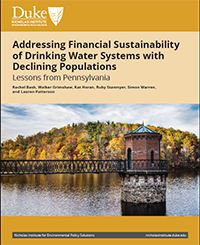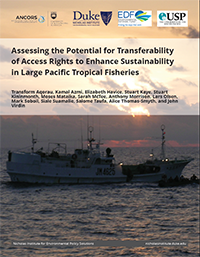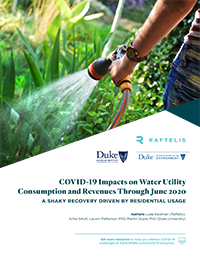Publications
Addressing Financial Sustainability of Drinking Water Systems with Declining Populations: Lessons from Pennsylvania
This report focuses on the challenges facing water utilities in areas where population has declined in the Commonwealth of Pennsylvania. A total of 16 water systems were broadly analyzed, with in-depth analyses of four municipal water systems in the cities of Altoona, Chester, Johnstown, and Reading. These four cases highlight some of the overall trends and complications faced by shrinking cities.
Options on a Continuum of Competition for the Southeastern Electricity Sector
The purpose of this policy brief is to describe different ways to engender consumer choice, third-party participation, resource sharing, and regional grid management in the power sector, using existing examples from this region. It includes questions stakeholders might think through in these conversations, and fundamentally aims to educate and inform.
Assessing the Potential for Transferability of Access Rights to Enhance Sustainability in Large Pacific Tropical Fisheries
This study was conducted in order to identify options for the transferability of fishing rights in the context of Pacific Island commercial longline and purse seine tuna fisheries. The motivation for conducting this study was to provide information that can assist policy makers and fisheries managers in the region to consider if this policy instrument (enhanced transferability of fishing rights) could support achievement of the goals agreed in the Regional Roadmap for Sustainable Pacific Fisheries.
2020 Aspen-Nicholas Water Forum Water Affordability and Equity Briefing Document
This paper explores the evolution of water services in the United States. Most people have access to water, most tap water is drinkable, most dams are secure, most farms can grow more with less water, and most rivers are cleaner than they were 50 years ago. Most does not mean all. There is growing evidence that an increasing number of Americans are losing access to safe drinking water and sanitation—and others never had it at all.
COVID-19 Impacts on Water Utility Consumption and Revenues Through June 2020
May and June 2020 data for the eight water utilities in our study show diverging trends of water consumption and revenues as the COVID-19 pandemic continues, with states and local governments taking different approaches and timelines to rolling back restrictions. There are signs of recovery in water consumption and revenues for many utilities, mostly due to high residential consumption and billed revenues, not increased usage from non-residential customers.
Mapping Ecosystem Services for the Southeast United States: Conservation and Restoration Priorities for Water Purification
This methods brief focuses on water purification by natural land cover, which removes nonpoint-source pollutants from runoff water before they reach waterways. This analysis maps natural land cover within the likely flowpaths of water from agricultural areas to waterways.
Concept Note for Sustainable Infrastructure Community of Learners
To aid economic recovery following the COVID-19 pandemic, new funding is being pledged globally to support infrastructure construction. Such investments by themselves, however, will not necessarily promote sustainable development. An opportunity exists to significantly accelerate the adoption of sustainable infrastructure (SI) by taking advantage of the recent proliferation of capacity development programs and tools. One key to achieving this transformation is the establishment of a learning community among SI capacity resource providers and SI capacity resource clients.
Rural Attitudes on Climate Change: Lessons from National and Midwest Polling and Focus Groups
Following a nationwide report of rural attitudes toward the environment and conservation published in February 2020, this report takes a closer look at attitudes about climate change among rural voters. We draw on findings from the national study and incorporate new research with a regional focus on the upper Midwest.
Attitudes of Rural Westerners on the Environment and Conservation
This report builds on the Nicholas Institute for Environmental Policy Solutions’ (NIEPS) report Understanding Rural Attitudes Toward the Environment and Conservation in America. Using the same polling, focus groups, and rural stakeholder leader interviews data from this earlier report, we focus here on the attitudes of rural western voters by taking a deeper look at data from western rural voters.
Climate Change Is Here, but Who Is Paying for It?
State and local governments have advanced their own initiatives on climate change when faced with a failure of federal leadership. This analysis looks at the challenge of costs to states in mitigating and developing resiliency to climate change.










